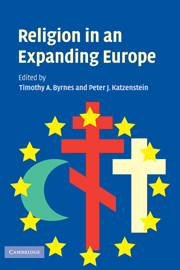Book contents
- Frontmatter
- Contents
- List of contributors
- Preface
- 1 Multiple modernities as limits to secular Europeanization?
- Part I European settings
- 2 Faith, freedom, and federation: the role of religious ideas and institutions in European political convergence
- 3 Religion, European secular identities, and European integration
- Part II Catholicism
- Part III Orthodoxy
- Part IV Islam
- Part V Conclusion
- References
- Index
3 - Religion, European secular identities, and European integration
Published online by Cambridge University Press: 22 September 2009
- Frontmatter
- Contents
- List of contributors
- Preface
- 1 Multiple modernities as limits to secular Europeanization?
- Part I European settings
- 2 Faith, freedom, and federation: the role of religious ideas and institutions in European political convergence
- 3 Religion, European secular identities, and European integration
- Part II Catholicism
- Part III Orthodoxy
- Part IV Islam
- Part V Conclusion
- References
- Index
Summary
Since the signing of the Treaty of Rome in 1957 that established the EEC and initiated the ongoing process of European integration, Western European societies have undergone a rapid, drastic, and seemingly irreversible process of secularization. In this respect, one can talk of the emergence of a post-Christian Europe. At the same time, the process of European integration, the eastward expansion of the European Union, and the drafting of a European constitution have triggered fundamental questions concerning European identity and the role of Christianity in that identity. What constitutes “Europe”? How and where should one draw the external territorial and the internal cultural boundaries of Europe? The most controversial, yet rarely openly confronted and therefore most anxiety-producing, issues are the potential integration of Turkey and the potential integration of non-European immigrants, who in most European countries happen to be overwhelmingly Muslim. But the eastward expansion of the European Union, particularly the incorporation of an assertive Catholic Poland, and the debates over some kind of affirmation or recognition of the Christian heritage in the preamble of the new European constitution, have added unexpected “religious” irritants to the debates over Europeanization. It is the interrelation between these phenomena – the role of Catholic Poland, the incorporation of Turkey, the integration of Muslim immigrants, and references to the Christian heritage in the European constitution – and the European secular mindset that I would like to explore in this chapter.
- Type
- Chapter
- Information
- Religion in an Expanding Europe , pp. 65 - 92Publisher: Cambridge University PressPrint publication year: 2006
- 98
- Cited by

